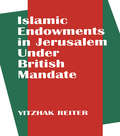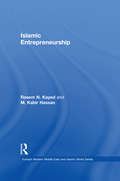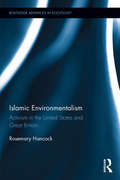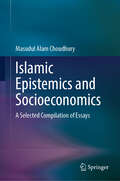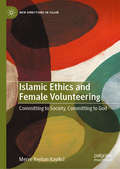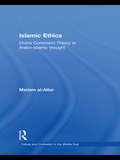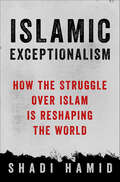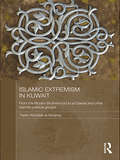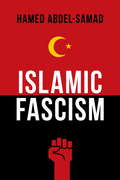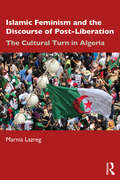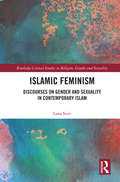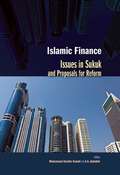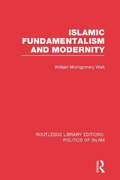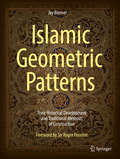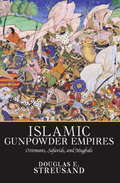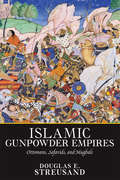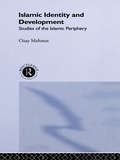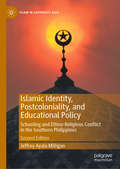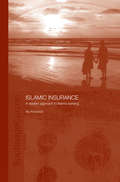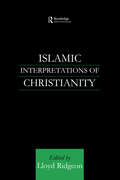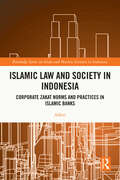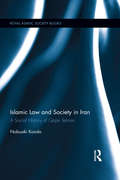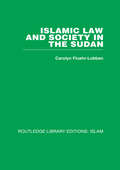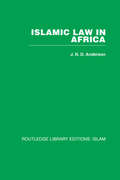- Table View
- List View
Islamic Endowments in Jerusalem Under British Mandate
by Yitzhak ReiterYitzhak Reiter presents a picture of the role of Islam in mandatory Jerusalem through the resources of the Waqf. The prevalent image of institutionalized corruption within the Waqf system is not completely supported by the findings of the study.
Islamic Entrepreneurship (Durham Modern Middle East and Islamic World Series)
by M. Kabir Hassan Rasem N. KayedThis book discusses the idea that there is a specific Islamic form of entrepreneurship. Based on extensive original research amongst small and medium sized enterprises in Saudi Arabia, it shows how businesses are started and how they grow in the context of an Islamic economy and society. It argues that as specific Islamic approaches to a wide range of economic activities are being formulated and implemented, there is indeed a particular Islamic approach to entrepreneurship. Examining the relationship between Islamic values and entrepreneurial activity, the book considers whether such values can be more effectively used in order to raise the profile of Islamic entrepreneurship, and also to promote alternatives to development in the contemporary business environment. The book analyses the nature of entrepreneurship, and the special qualities of Islamic entrepreneurship, and discusses how the Islamic approach to entrepreneurship can be encouraged and developed further still
Islamic Environmentalism: Activism in the United States and Great Britain (Routledge Advances in Sociology)
by Rosemary HancockIslamic Environmentalism examines Muslim involvement in environmentalism in the United States and Great Britain. The book focuses upon Muslim activists and Islamic organizations that approach environmentalism as a religious duty: offering environmental readings of Islamic scriptures, and integrating religious ritual and practice with environmental action. Honing in on the insights of social movement theory, Hancock predominantly examines the activism and experience of Muslims involved in environmentalism and bases her research on interviews with activists in the United States and Great Britain. Indeed, the reader is first provided with an insightful analysis of the ways in which Muslim activists interpret and present environmentalism—diagnosing causes of environmental crises, proposing solutions, and motivating other Muslims into activism. This is followed by a discussion of the importance of affective ties, emotion and group culture in motivating and sustaining Muslim involvement in environmental activism. A timely volume which draws attention to the synthesis of political activism and religious practice amongst Muslim environmentalists, this book will be of interest to undergraduates, postgraduates and postdoctoral researchers interested in fields such as Islamic Studies, Sociology of Religion, Social Movement Theory and Environmental Studies.
Islamic Epistemics and Socioeconomics: A Selected Compilation of Essays
by Masudul Alam ChoudhuryThis book presents selected essays on the epistemological foundation of the Islamic world-system, in the light of the exegesis of the Qur’an, to develop existing understandings of Islamic economics. A selection of key contributions by one of the world's leading figures working at the nexus of Islamic social sciences, Islamic philosophy, and Islamic economics, the book integrates applied foundations of Islamic economics and Islamic philosophy, presenting a critical outlook on the existing state of Islamic economics and Islamic finance, within a broader framework of socio-scientific enquiry, philosophical perspectives on Islam, and philosophy of science. The author confronts the absence of epistemic groundwork upon which any fresh social and scientific enquiry is developing in Islamic economics, casting the discussion within an explanatory framework of ‘the unity of knowledge’ as bestowed by Islamic monotheistic law, which substantively characterizes the generalization and details of ‘everything’. The present work unravels this objective methodology and its application with reference to a limited number of issues and problems in global economics. Complex and multidisciplinary in its treatment, this book presents the key arguments on mathematical, philosophical, and socio-scientific modes of inquiry in deriving, developing, and empirically applying the Qur’anic methodology of the “unity of knowledge” to economic problems. It is relevant to scholars and advanced students in social scientific studies of Islam, Islamic theology and philosophy, and Islamic economics and finance.
Islamic Ethics and Female Volunteering: Committing to Society, Committing to God (New Directions in Islam)
by Merve Reyhan KayikciThis book unpacks how the ethical is embodied through an examination of the lived experiences of female Muslim volunteers in Belgium. Kayikci draws on a wealth of interview material that sheds light on the ethical turn in the anthropology of Islam, exploring how volunteering enables the space and time for Muslim women to commit to both orthodox religious and civic social values. As volunteering and interacting (caring) with the society requires careful deliberation of their society and their position as Muslims, and as women in that society, this research unpacks how multiple belongings of Muslim women in Belgium are negotiated, balanced, and influenced. This analysis reveals how the everyday is informed by different epistemological traditions; both the liberal and the Islamic, and how these traditions make the life-worlds of the women. Islamic Ethics and Female Volunteering will be of interest to academics across religious studies, anthropology, sociology, gender studies and community studies, especially scholars working in the areas of ethics, migration, Muslims in Europe, volunteering and activism.
Islamic Ethics: Divine Command Theory in Arabo-Islamic Thought (Culture and Civilization in the Middle East)
by Mariam al-AttarThis book explores philosophical ethics in Arabo-Islamic thought. Examining the meaning, origin and development of "Divine Command Theory", it underscores the philosophical bases of religious fundamentalism that hinder social development and hamper dialogue between different cultures and nations. Challenging traditional stereotypes of Islam, the book refutes contemporary claims that Islam is a defining case of ethical voluntarism, and that the prominent theory in Islamic ethical thought is Divine Command Theory. The author argues that, in fact, early Arab-Islamic scholars articulated moral theories: theories of value and theories of obligation. She traces the development of Arabo-Islamic ethics from the early Islamic theological and political debates between the Kharijites and the Murji’ites, shedding new light on the moral theory of Abd al-Jabbar al-Mu’tazili and the effects of this moral theory on post-Mu’tazilite ethical thought. Highlighting important aspects in the development of Islamic thought, this book will appeal to students and scholars of Islamic moral thought and ethics, Islamic law, and religious fundamentalism.
Islamic Exceptionalism: How the Struggle Over Islam Is Reshaping the World
by Shadi HamidIn Islamic Exceptionalism, Brookings Institution scholar and acclaimed author Shadi Hamid offers a novel and provocative argument on how Islam is, in fact, "exceptional" in how it relates to politics, with profound implications for how we understand the future of the Middle East. Divides among citizens aren't just about power but are products of fundamental disagreements over the very nature and purpose of the modern nation state—and the vexing problem of religion’s role in public life. Hamid argues for a new understanding of how Islam and Islamism shape politics by examining different models of reckoning with the problem of religion and state, including the terrifying—and alarmingly successful—example of ISIS. With unprecedented access to Islamist activists and leaders across the region, Hamid offers a panoramic and ambitious interpretation of the region's descent into violence. Islamic Exceptionalism is a vital contribution to our understanding of Islam's past and present, and its outsized role in modern politics. We don't have to like it, but we have to understand it—because Islam, as a religion and as an idea, will continue to be a force that shapes not just the region, but the West as well in the decades to come.
Islamic Extremism in Kuwait: From the Muslim Brotherhood to Al-Qaeda and other Islamic Political Groups (Durham Modern Middle East and Islamic World Series)
by Falah Abdullah al-MdairesThis book is the first to provide a complete overview of Islamic extremism in Kuwait. It traces the development of Islamist fundamentalist groups in Kuwait, both Shiite and Sunni, from the beginning of the twentieth century. It outlines the nature and origins of the many different groups, considers their ideology and organization, shows how their activities are intertwined with the wider economy, society and politics to the extent that they are now a strong part of society, and discusses their armed activities, including terrorist activities. Although focusing on Kuwait, it includes overage of the activities of Islamist groups in other Gulf States. It also discusses the relation between Ruling Families with Islamist political groups, thereby demonstrating that the intertwining of Islamic ideology and armed activities with politics is not a new development in the region.
Islamic Fascism
by Hamed Abdel-SamadThis polemic against Islamic extremism highlights the striking parallels between contemporary Islamism and the 20th-century fascism embodied by Hitler and Mussolini. Like those infamous ideologies, Islamism today touts imperialist dreams of world domination, belief in its inherent superiority, contempt for the rest of humanity, and often a murderous agenda. The author, born and raised in Egypt and now living in Germany, not only explains the historical connections between early 20th-century fascist movements in Europe and extremist factions in Islam, but he also traces the fascist tendencies in mainstream Islam that have existed throughout its history.Examining key individuals and episodes from centuries past, the book shows the influence of Islam's earliest exploits on current politics in the Islamic world. The author's incisive analysis exposes the fascist underpinnings of the Muslim Brotherhood, Hamas, Hezbollah, the Shia regime in Iran, ISIS, Salafi and Jihadist ideologies, and more. Forcefully argued and well-researched, this book grew out of a lecture on Islamic fascism that the author gave in Cairo, resulting in a call for his death by three prominent Egyptian clerics.From the Hardcover edition.
Islamic Feminism and the Discourse of Post-Liberation: The Cultural Turn in Algeria
by Marnia LazregThis important study examines the cultural turn for women in the Middle East and North Africa, analyzing the ways they have adjusted to and at times defended, socially conservative redefinitions of their roles in society in matters of marriage, work, and public codes of behavior. Whether this cultural turn is an autochthonous response, or an alternative to Western feminism, Islamic Feminism and the Discourse of Post-Liberation: The Cultural Turn in Algeria examines the sources, evolution, contradictions as well as consequences of the Cultural Turn. Focusing on Algeria, but making comparisons with Tunisia and Morocco, it takes an in-depth look at Islamic feminism and studies its functions in the geopolitics of control of Islam. It also explores the knowldge effects of the cultural turn and crucially identifies a critical way of re-orienting feminist thought and practice in the region. This new work from a highly regarded scholar will appeal to researchers, graduates, and undergraduates in North African studies; Middle Eastern studies; sociology, women and gender studies; anthropology; political science; and ethnic and critical race studies.
Islamic Feminism: Discourses on Gender and Sexuality in Contemporary Islam (Routledge Critical Studies in Religion, Gender and Sexuality)
by Lana SirriThis book sets out a rationale for the compatibility of Islam and Feminism and shows that Islamic Feminism is a diverse and valuable lens through which to analyse religion and gender. In addition, including scholarship written in Arabic, it promotes the decolonisation of knowledge production around Islam, gender and sexuality. Islamic feminism is a field of study that has been marginalised both in contemporary Islamic discourse and in feminist discourse. This study counters this marginalisation in two ways. Firstly, it enumerates the diversity of approaches used in Islamic feminist scholarship. Secondly, it foregrounds voices that are often neglected in discussions of Islam, gender and sexuality by highlighting and contrasting the work of two key scholars: Kecia Ali based in the USA and Olfa Youssef based in Tunisia. The book suggests that in addition to geo-political positioning, language, as a ‘prior-text’, also influences an individual’s personal interpretation of Islamic feminism. This comparison, therefore, enables broader issues to be dissected, such as the interrelationships between life experiences, strategies of resistance to patriarchal and other forms of oppression, and the production of knowledge. This is a unique study of Islamic Feminism that will be of great use to any scholar of Religion and Gender, Islamic Studies, Gender Studies and the Sociology of Religion.
Islamic Finance: Issues in Sukuk and Proposals for Reform
by Mohammad Hashim Kamali A. K. AbdullahThis collection of essays brings together leading scholars and practitioners to discuss contemporary issues in the rapidly expanding sukuk market, and frankly debates the challenges facing it since the 2008 financial crisis.Highly recommended for practitioners, scholars, and students of Islamic finance.Professor Mohammad Hashim Kamali is the founding chairman and CEO of the International Institute of Advanced Islamic Studies (IAIS) in Malaysia, and is a leading authority in Islamic jurisprudence, Islamic finance, and human rights in Islamic law.A.K. Abdullah is an assistant research fellow at the IAIS.
Islamic Fundamentalism and Modernity: Politics Of Islam: Islamic Fundamentalism And Modernity (Routledge Library Editions: Politics of Islam)
by William Montgomery WattIslam is a burning topic in modern scholarship and contemporary world affairs. It is a subject poorly understood by Western observers, and in this book Professor Montgomery Watt takes a significant step towards its demystification. Montgomery Watt examines the crucial questions of traditional world-view and self-image which dominate the thinking of Muslims today. This traditional self-image causes them to perceive world events in a different perspective from Westerners – a fact not always appreciated by the foreign ministries of Western powers. Professor Watt presents a brilliant and critical analysis of the traditional Islamic self-image, showing how it distorts Western modernism and restricts Muslims to a peripheral role in world affairs. In a scholarly and incisive way, he traces this harmful image to its origins in the medieval period and then to the traumatic exposure of Muslims to the West in modern times. He argues that Muslim culture is suffering from a dangerous introspection, and in his closing chapters presents a constructive criticism of contemporary Islam, aimed at contributing to a truer, more realistic Islamic self-image for today. First published in 1988.
Islamic Geometric Patterns
by Jay BonnerThe main focus of this unique book is an in-depth examination of the polygonal technique; the primary method used by master artists of the past in creating Islamic geometric patterns. The author details the design methodology responsible for this all-but-lost art form and presents evidence for its use from the historical record, both of which are vital contributions to the understanding of this ornamental tradition. Additionally, the author examines the historical development of Islamic geometric patterns, the significance of geometric design within the broader context of Islamic ornament as a whole, the formative role that geometry plays throughout the Islamic ornamental arts (including calligraphy, the floral idiom, dome decoration, geometric patterns, and more), and the underexamined question of pattern classification. Featuring over 600 beautiful color images, Islamic Geometric Patterns: Their Historical Development and Traditional Methods of Con struction is a valuable addition to the literature of Islamic art, architecture and geometric patterns. This book is ideal for students and scholars of geometry, the history of mathematics, and the history of Islamic art, architecture, and culture. In addition, artists, designers, craftspeople, and architects will all find this book an exceptionally informative and useful asset in their fields. Jay Bonner is an architectural ornamentalist and unaffiliated scholar of Islamic geometric design. He received his MDes from the Royal College of Art in London (1983). He has contributed ornamental designs for many international architectural projects, including the expansion of both the al-Masjid al-Haram (Grand Mosque) in Mecca, and the al-Masjid an Nawabi (Prophet's Mosque) in Medina, as well the Tomb of Sheikh Hujwiri in Lahore, and the Ismaili Centre in London - to name but a few. He is committed to the revitalization of Islamic geometric design through the teaching of traditional methodological practices. To this end, in addition to publishing, Jay Bonner has lectured and taught design seminars at many universities and conferences in North America, Europe, North Africa and Asia.
Islamic Gunpowder Empires
by Douglas E. StreusandA comparative introduction to the three great Islamic empires OCo the Ottomans, Safavids, and Mughals OCo illuminating their unique characters as well as their shared experiences of rise to power, expansion, transformation, and decline. "
Islamic Gunpowder Empires: Ottomans, Safavids, and Mughals
by Douglas E. StreusandIslamic Gunpowder Empires provides readers with a history of Islamic civilization in the early modern world through a comparative examination of Islam's three greatest empires: the Ottomans (centered in what is now Turkey), the Safavids (in modern Iran), and the Mughals (ruling the Indian subcontinent). Author Douglas Streusand explains the origins of the three empires; compares the ideological, institutional, military, and economic contributors to their success; and analyzes the causes of their rise, expansion, and ultimate transformation and decline. Streusand depicts the three empires as a part of an integrated international system extending from the Atlantic to the Straits of Malacca, emphasizing both the connections and the conflicts within that system. He presents the empires as complex polities in which Islam is one political and cultural component among many. The treatment of the Ottoman, Safavid, and Mughal empires incorporates contemporary scholarship, dispels common misconceptions, and provides an excellent platform for further study.
Islamic Homosexualities
by Will Roscoe Stephen O. MurrayThe dramatic impact of Islamic fundamentalism in recent years has skewed our image of Islamic history and culture. Stereotypes depict Islamic societies as economically backward, hyper-patriarchal, and fanatically religious. But in fact, the Islamic world encompasses a great diversity of cultures and a great deal of variation within those cultures in terms of gender roles and sexuality. The first collection on this topic from a historical and anthropological perspective, Homosexuality in the Muslim World reveals that patterns of male and female homosexuality have existed and often flourished within the Islamic world. Indeed, same-sex relations have, until quite recently, been much more tolerated under Islam than in the Christian West. Based on the latest theoretical perspectives in gender studies, feminism, and gay studies, Homosexuality in the Muslim World includes cultural and historical analyses of the entire Islamic world, not just the so-called Middle East. Essays show both age-stratified patterns of homosexuality, as revealed in the erotic and romantic poetry of medieval poets, and gender-based patterns, in which both men and women might, to varying degrees, choose to live as members of the opposite sex. The contributors draw on historical documents, literary texts, ethnographic observation and direct observation by both Muslim and non-Muslim authors to show the considerable diversity of Islamic societies and the existence of tolerated gender and sexual variances.
Islamic Identity and Development: Studies of the Islamic Periphery
by Ozay MehmetTurkey and Malaysia, two countries on the Islamic periphery, are often not included in discussions of Islamic reassertion and identity. Yet both have been at the forefront of modernization and development, and are exposed to a rising trend of Islamic revival which discloses a deep, psychological identity crisis. In Islamic Identity and Development, Ozay Mehmet examines this identity crisis in the wider context of the Islamic dilemma of reconciling nationalism with Islam. He sees the Islamic revival primarily as a protest movement, concentrated among urban migrant settlements where uneven post-war growth has upset the traditional Islamic order. He argues that Islamic societies must move towards greater openness and an organic relationship between rulers and ruled. In particular, Mehmet suggests the need for a public policy that is not only responsive to material human needs but which also satisfies the ethical preconditions of the Islamic social contract.
Islamic Identity, Postcoloniality, and Educational Policy: Schooling and Ethno-Religious Conflict in the Southern Philippines (Islam in Southeast Asia)
by Jeffrey Ayala MilliganThis book theorizes a philosophical framework for educational policy and practice in the southern Philippines where decades of religious and political conflict between a minority Muslim community and the Philippine state has plagued the educational and economic development of the region. It offers a critical historical and ethnographic analysis of a century of failed attempts under successive U.S. colonial and independent Philippine governments to deploy education as a tool to mitigate the conflict and assimilate the Muslim minority into the mainstream of Philippine society and examines recent efforts to integrate state and Islamic education before proposing a philosophy of prophetic pragmatism as a more promising framework for educational policy and practice that respects the religious identity and fosters the educational development of Muslim Filipinos. It represents a timely contribution to the search for educational policies and practices more responsive to the needs and religious identities of Muslim communities emerging from conflict, not only in the southern Philippines, but in other international contexts as well.
Islamic Insurance: A Modern Approach to Islamic Banking (Islamic Studies)
by Aly KhorshidSome Muslims believe insurance is unnecessary, as society should help its victims. Muslims can no longer ignore the fact that they live, trade and communicate with open global systems, and they can no longer ignore the need for banking and insurance. Aly Khorshid demonstrates how initial clerical apprehensions were overcome to create pioneering Mus
Islamic Interpretations of Christianity
by Lloyd RidgeonMany books about Islam and Christianity are comparative however this book examines Christianity from an Islamic perspective. Each chapter focuses upon theological, philosophical and mystical issues, which are as relevant today as they always have been in the Muslim-Christian dialogue. The book is divided into two sections: the classical and modern periods, thus the reader will benefit from a broad overview of the myriad Islamic interpretations of Christianity.
Islamic Law and Society in Indonesia: Corporate Zakat Norms and Practices in Islamic Banks (Routledge Series on Islam and Muslim Societies in Indonesia)
by AlfitriNo corporation is enthusiastic about paying tax, yet Islamic banks in Indonesia voluntarily pay corporate zakat. Why? The book analyzes corporate zakat norms and practices in Indonesia by investigating how Muslim jurists have interpreted sharīʿa of zakat and how these have been imposed through the legislative and regulatory framework. It also presents original case studies based on sociolegal field research on the reception of the new obligations in the Islamic banks that choose to pay – and choose not to pay – what is effectively a new tax. The book argues that the dynamics of sharīʿa interpretation, imposition, and compliance in Indonesia are too complex to be defined using the binaries of the religious versus the secular, public versus private, or tradition versus modernity. The corporate zakat context has revitalized the existing governance strategy in Islamic legal tradition and created a shared Islamic law vision between Islam and the state. Consequently, this fusion generates a mixed legal and religious consciousness toward corporate zakat. Addressing broader discussions on Islamic law and modernity, the book will be of interest to academics working on Asian and Comparative Law, sociolegal studies, anthropology of Indonesia, business studies of the Islamic world, Islamic/sharīʿa economics, Islamic law and politics, Islamic legal studies, Muslim society and Islam in Southeast Asia.
Islamic Law and Society in Iran: A Social History of Qajar Tehran (Royal Asiatic Society Books)
by Nobuaki KondoThe relationship between Islamic law and society is an important issue in Iran under the Islamic Republic. Although Islamic law was a pivotal element in the traditional Iranian society, no comprehensive research has been made until today. This is because modern reformers emphasized the lack of rule of law in nineteenth-century Iran. However, a legal system did exist, and Islamic law was a substantial part of it. This is the first book on the relationship between Islamic law and the Iranian society during the nineteenth century. The author explores the legal aspects of urban society in Iran and provides the social context in which political process occurred and examines how authorities applied law in society, how people utilized the law, and how the law regulated society. Based on rich archival sources including court records and private deeds from Qajar Tehran, this book explores how Islamic law functioned in Iranian society. The judicial system, sharia court, and religious endowments (vaqf) are fully discussed, and the role of ‘ulama as legal experts is highlighted throughout the book. It challenges nationalist and modernist views on nineteenth-century Iran and provides a unique model in terms of the relationship between Islamic law and society, which is rather different from the Ottoman case. Providing an understanding of this legal system in Iran and its role in society, this book offers a basis for assessing the motives and results of modern reforms as well as the modernist discourse. This book will be of interest to students of Middle Eastern and Iranian Studies.
Islamic Law and Society in the Sudan
by Carolyn Fluehr-LobbanFew studies exist which deal with Islamic law in practice, and this is among the first such studies in the English language for Islamic Africa. It is significant that the present study was completed just prior to the extension of Islamic law as the sole governing law in the Sudan in 1983, for it captures many essentials of the Shari’a as it has been applied for decades prior to this important change. Numerous movements for reform and change are discussed in the book, which reflect the contemporary debate in the Sudan over the position of Shari’a in society.
Islamic Law in Africa
by J N AndersonIn many parts of Africa three different systems of laws are concurrently applied – the imported "Colonial" law, the indigenous customary law and Islamic law. In some countries the customary and the Islamic law are kept separate and distinct, while in others they are fused into a single system. This volume represents a unique survey of the extent to which Islamic law is in fact applied in those parts of East and West Africa which were at one time under British administration. It examines the relevant legislation and case law, much of which has never appeared in any Law Reports; the judges and courts which apply it and the problems to which its application give rise.
